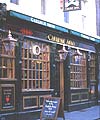| The definite article: context-specific and with abstract nouns | ||
 |
||||||
|
Michael Loukanov from Bulgaria, writing to the BBC ELT message board, comments: Sometimes there are some difficult situations in which you cannot be sure whether the things you are referring to are specific or not. Sometimes they are specific not because the speaker has expressly mentioned them, but because the context renders them as such. When do we use definite articles here? And
what about abstract uncountable nouns? We are taught that when qualified
they can take a definite (or indefinite article) but when should
we consider them qualilfied? |
| |
||
| Roger Woodham replies: | ||
| Context-specific
nouns: the
It is clear that when we first refer to a particular person or thing we normally use the indefinite article, a, and then, once it has been identified, we continue with the definite article, the. Compare the following:
But what about the bottom of the garden, the sunshine and the apple tree? I haven't mentioned them before, yet immediately I use the definite article. I do so because I am referring to a known context. It is obvious to the person I am speaking to that I am referring to my own garden and apple tree. It is clear from the situation which ones I mean. The is used with sunshine because we are here talking about something that is unique, like the moon and the stars and the wind and the rain. Compare also the following:
Clearly, there are many possibilities of restaurant. It could be an Italian, an Indian, a Thai or a Chinese restaurant, so a or an is appropriate. But I have not specified the pub either. It could be one of many, yet I have used the. I have used the because I am thinking of a typical pub as a general feature of our environment. The same applies to supermarket in the next example. I have never
been to this holiday village before, so have no knowledge of which
supermarkets are available, yet I have used the because I
am thinking of a typical supermarket. But in this example, if you
are thinking of one of many, a supermarket would also be
possible. |
||||
|
Qualified abstract nouns: the or zero article? Note that when we are using abstract nouns that are not qualified or not fully qualified, zero article is normal usage:
As you point out, Michael, abstract nouns are fully qualified when they are followed by a defining relative clause (introduced by who/which/that) or by the preposition of + noun phrase. Under these circumstances, the before the abstract noun is normally required:
Note that happiness is considered to be one of a number of human
rights, so an indefinite article is used with this abstract noun. |
|
If you would like more practice more please visit our in the You, Me and Us part of our website. |
||||
| |
||